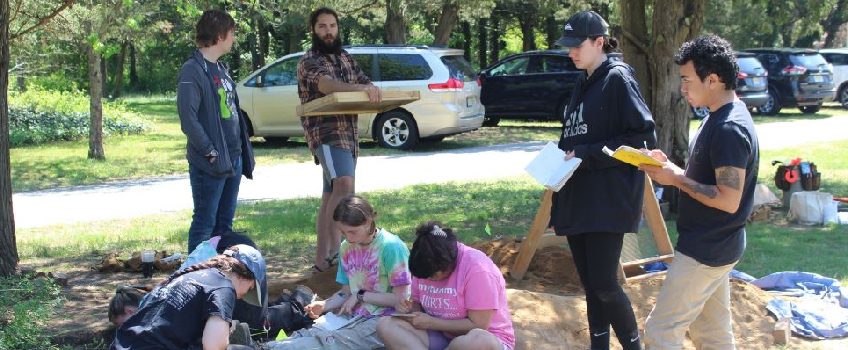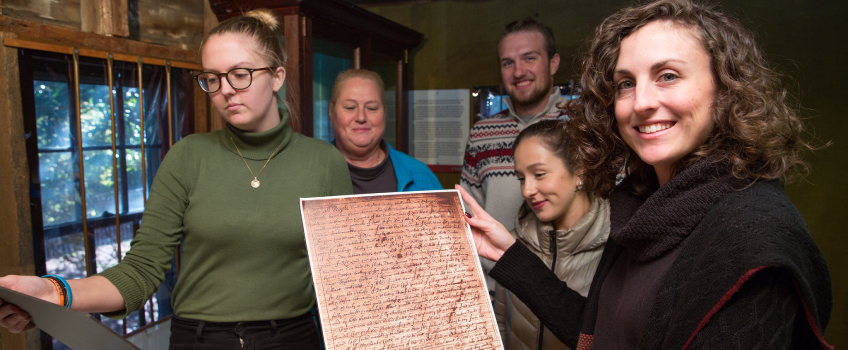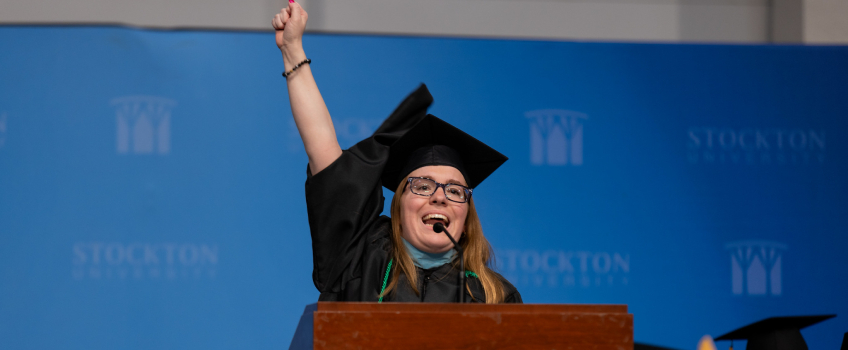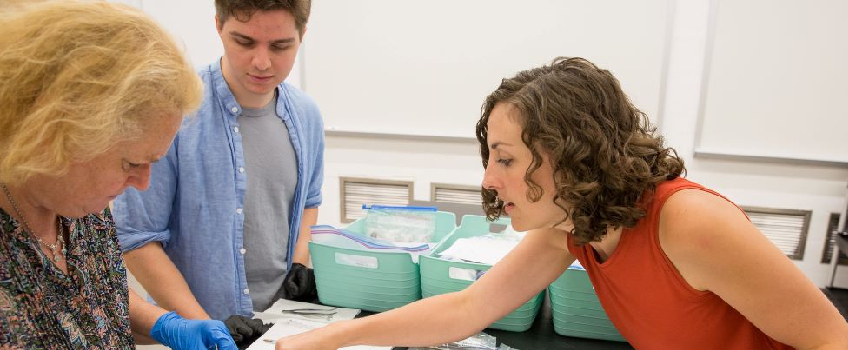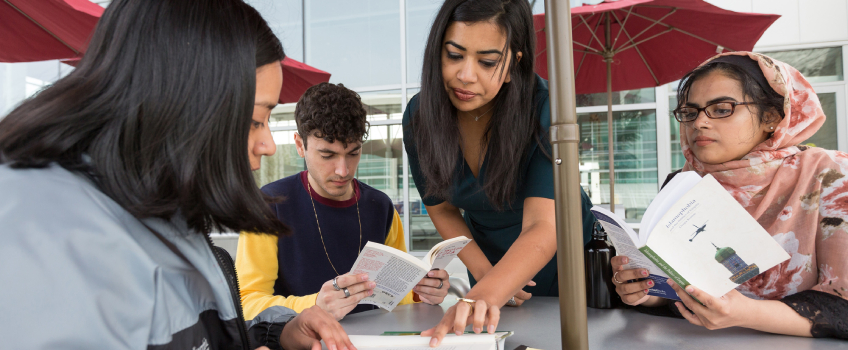Sociology and Anthropology
Explore the heart of human interaction and uncover the patterns of behavior that define societies and cultures.
As Sociologists and Anthropologists, we prepare students across disciplines to critically analyze the nature and transformation of the human condition and to confront problems and possibilities facing our uneven and interconnected world.
With a focus on community engagement to address social inequities, ŇůĐÔĘÓƵ’s Sociology and Anthropology program cultivates critical thinking, research and writing skills, and prepares students for careers and/or graduate study in a wide range of professional fields.
About the Program
The Sociology and Anthropology (SOCY/ANTH) program at ŇůĐÔĘÓƵ dives into the complexities of human societies and cultures, with a strong commitment to social justice issues such as race, ethnicity, social class, gender, sexuality, migration, and imperialism. This interdisciplinary program not only provides a deep understanding of human interactions, institutions, and inequalities but also emphasizes hands-on community engagement and service-learning.
Students will explore a variety of research methods, from fieldwork and ethnography to interviews, focus groups, and statistical analysis, equipping them with both qualitative and quantitative skills for a comprehensive understanding of social and cultural phenomena. Whether studying the dynamics of everyday life or the broader aspects of cultural and social systems, our program invites students to engage deeply with the world around them, preparing them for meaningful contributions to society.
Sociology Versus Anthropology
Sociology (SOCY) investigates human social life, social change, and the social causes and consequences of human behavior. Sociologists study social interaction among individuals, groups, and cultures; the institutions that constitute a society; and the processes that create, sustain, and resist social inequality. In addition, sociological analysis sharpens the understanding of various levels of social life, from interpersonal interactions (such as those found in families, small work groups, friendships, and casual encounters); through the organization and function of social institutions (such as the family, education, religions, politics, media, and medicine); to the structure and functioning of social systems as a whole (class structure, racial/ethnic relations, cultural ideologies, and various legal and governmental processes).
Anthropology (ANTH), on the other hand, asks what it means to be human in specific cultural and timebound contexts. As such, the discipline has an international and comparative focus. In Anthropology, people are understood in terms of their biological and behavioral variation cross-culturally and through time. In particular, ethnographic field methods expose students to lived realities in a range of cultural contexts. While our program’s primary focus is Cultural Anthropology, students also have opportunities to study the other main fields of Anthropology: Archaeology, Biological Anthropology, and Linguistics. Anthropological analysis investigates the dynamics of culture including kinship, ethnicity, religion, nationalism, colonialism, migration, and inequality.
Student Learning Goals
- Developing Research Skills
- Writing and Communication
- Understanding Inequality
- Promoting Community Engagement
Program Chair:

Associate Professor of Sociology
609-652-4639
Office: G208
betsy.erbaugh@stockton.edu
 More Information About:
More Information About:
- (American Sociological Association)
- (American Anthropological Association)
- (American Society for Archaeology)
- (American Association of Biological Anthropologists)
The Curriculum
All students in the Sociology/ Anthropology major are expected to develop a command of the essential substantive and methodological core of Sociology and Anthropology. Beyond this core, students are able to build upon their specific interests within the major, in cognate areas, and in areas “at-some-distance” from the major. The program promotes internships and overseas study to enable students to gain practical and professional development and to apply the knowledge derived from their university experience. Finally, program courses strongly encourage students to actively participate in community and civic engagement and service-learning projects.
For a B.A. degree in Sociology/Anthropology, students must satisfactorily complete 64 credits in program and cognate studies, as well as the University’s 64-credit general education requirement.
Curriculum Worksheets
(Program minors included)
*Please refer to Degree Works for General Studies, At-Some-Distance, and Course Attribute requirements.
The program is open to any ŇůĐÔĘÓƵ student with an interest in Sociology or Anthropology. To ensure that all program requirements are met for graduation by the end of the senior year, students are encouraged to declare the major by the beginning of their junior year. Choosing a Concentration is optional but not required. Transfer students are especially urged to consult with the program chair before enrolling in classes. When declaring a major in Sociology/Anthropology, students should select a preceptor from the program who will assist in making course selections and advise them on career options.
To declare the major or minor in Sociology/Anthropology:
All major and minor changes/declarations must be submitted digitally. To make a request, log in to your Go ŇůĐÔĘÓƵ portal. Access your Student Services tab > Student Tools > Change of Major/Minor.
-
- Visit the Academic Advising websitefor more information and forms to declare the major or minor.
Students planning to take advantage of one of the concentration options may declare these intentions in the go-portal. Students are encouraged to choose a General Concentration until they have the opportunity to consult with their SOCY/ANTH program preceptor or the program chair.
These courses are required of all SOAN majors (20 credits):
- SOCY 1100 Introduction to Sociology or ANTH 1100: Introduction to Anthropology
- SOCY 3642: Social Research Methods
- ANTH 3643: Anthropological Field Methods
- SOCY/ANTH 3681: Social Theory
- SOCY/ANTH 4685: Senior Seminar
- SOCY/ANTH 4810: ePortfolio (0 credits)
These six required program courses should be taken in the following order:
- First/second year: One introductory course (ANTH 1100 or SOCY 1100) should be taken in the first or second year; students may take both if they wish.
- Junior year: During the junior year students should take Social Research Methods (SOCY 3642) in the fall and Field Methods (ANTH 3643) in the spring.
- Senior year: During the senior year students should take Social Theory in the fall (SOCY/ANTH 3681), and Senior Seminar (SOCY/ANTH 4685) and e-Portfolio (SOCY/ANTH 4810) concurrently in the spring (Senior Seminar and e-Portfolio are linked in course registration).
E-Portfolio Requirement
SOCY/ANTH majors complete a 0-credit e-Portfolio Course (SOCY/ANTH 4810) as part of
the requirements for graduation. An electronic Portfolio is a collection of digital
artifacts articulating experiences, achievements and learning, and a format for reflecting
on the student’s ŇůĐÔĘÓƵ experience. Students submit artifacts (previously completed
assignments) and reflect on how these assignments have helped to build skills and
competencies in four outcome areas: 
- Research Skills
- Writing Skills
- Understanding Inequality, and
- Community Engagement.
E-Portfolios are submitted by graduating seniors with the guidance of faculty and preceptors for a pass/fail grade at the end of their final term at ŇůĐÔĘÓƵ. The e-Portfolio facilitates SOCY/ANTH program assessment and enables each student to document personal progress, academic achievement, and professional skill development while at ŇůĐÔĘÓƵ.
Electives
Alongside Core courses and the ePortfolio, an additional five Elective courses (20
credits) drawn from either Sociology or Anthropology complete program requirements
for the major. Required electives vary by Concentration (specialized concentrations
are optional).
Program Competency
SOAN graduates demonstrate professional competencies in data literacy and cultural
studies. The program competency requirement may be met with either:
- One course in statistics, selected from the list of approved courses below, OR
- Completion of a minor in one of the following:
- Foreign language (Languages and Culture Studies); Africana Studies; Global Studies; Latin American and Caribbean Studies; Public Health; Sustainability; Women’s, Gender and Sexuality Studies; or another minor suited to the student’s academic and career plans, if approved by the student’s preceptor and the program chair.
Approved courses for program competency requirement in Statistics Are:
- CIST 1206 Statistics
- GNM 1110 Against All Odds
- CRIM 2145 Statistics for Criminal Justice
- PSYC 2241 Statistical Methods
- GSS 2348 Data Analysis for Social Sciences
- GNM 2114 Statistics and Sports
- ENVL 2400 Statistical Analysis of Ecological Systems
- PUBH 2310 Applied Biostatistics
- HLTH 2305 Statistics for Health Science Professionals
- BIOL 3105 Biostatistics
- BIOL/MARS 3115 Ecological Statistics
- MATH 4451 Probability & Statistics I
Other statistics course with approval
Cognates
The cognate courses (24 credits, equivalent to 6 courses) complement SOCY/ANTH program requirements. Cognates are generally chosen from the following Social and Behavioral Science disciplines: criminal justice, economics, gerontology, political science, psychology, and social work. Especially given that SOCY/ANTH is an inherently interdisciplinary program, other courses may be considered as cognates after consultation with a preceptor or the program chair. For example, business and information science courses may be considered cognate courses for students with certain educational aims, and “at-some-distance” courses for other students. Required courses for a (non-SOAN) minor, which would normally fall under “at-some-distance,” may also be considered cognates with program approval.
Many linkages are possible between SOCY/ANTH and fields such as social work, business studies, history, nursing, literature, health care, and computer science. Cognate or non-cognate clusters or minors, which may have career benefits for the students, can be constructed with the help of the preceptor. Finally, and again with the guidance of a preceptor, students may choose an area of study that specifically prepares them for graduate or professional school.
Concentrations
SOAN majors may choose a General Concentration (effectively a broad, interdisciplinary SOCY/ANTH major with no specified area of emphasis), or they may elect to complete a topical Concentration in one of the five areas:
- Sociology
- Anthropology
- Archaeolology
- Biological Anthropology
- Race/Ethnicity
Required electives vary by concentration. Focused concentrations are optional, not required, for majors or minors. Program concentrations are designed to augment an education in Sociology/Anthropology with special knowledge and skills that may be useful in graduate study or in a variety of occupations for students with specific fields of interest. It is also possible for students to focus more on either Sociology or Anthropology through those respective concentrations within the major (or by minoring in either SOCY or ANTH).
- General Concentration: Five electives (20 credits) in Sociology and/or Anthropology (effectively no specialty concentration). This is the most flexible, least restrictive concentration.
- “Focus” Concentrations:
- Anthropology: Five program electives (20 credits), including three or more in Anthropology.
- Sociology: Five program electives (20 credits), including three or more in Sociology.
The interdisciplinary Archaeology Concentration allows students to focus on material culture, relying upon fieldwork and laboratory techniques and interdisciplinary coursework. Incorporating courses in Natural Science and Mathematics (NAMS) and Arts and Humanities (ARHU), this concentration prepares students for careers in research science, museum/historical archival work and curation, and cultural resource management. The concentration is organized into foci, echoing the real-world methodological demands of archaeology, which gives students a competitive approach to their post-graduate goals.
- (Society for American Archaeology)
Requirements
The Archaeology Concentration requires a minimum of 20 credits drawn from courses in sociology/anthropology, history, art history. geology, environmental studies, and general studies. Preceptors will work with students to approve acceptable course substitutions if necessary. In consultation with faculty and the program chair, students may also have the opportunity to complete a field placement in archaeological field work.
Required Core Courses (12 credits):
- ANTH 1100 Intro to Anthropology
- ANTH 2108 Intro to Archaeology: Methods and Theory
Plus any one of the following ANTH courses:
- ANTH 2145 Indigenous Peoples of North America
- ANTH 2203 Material Culture
- ANTH 2255 Arctic Archaeology
- ANTH 2280 Vikings: Archaeology & Culture
- ANTH 2400 Forensic Anthropology
- ANTH 3338 Archaeology of the Mediterranean World
- ANTH 3653 Archaeological Field Methods
- ANTH 4900 Archaeology Internship/Field Work (organized w/ faculty & program chair)
Students are to choose the remaining 8 credits from the four foci described under each tab below. The courses students choose must be from the same focus and in addition to the required 12 credits listed above. For example, if ANTH 2145 is chosen as one of the required 12 above, then it does not count towards the remaining 8 focus courses.
This focus helps prepare students for a general/broad approach to archaeology. Archaeology is a type of anthropology, and as such, all archaeology is anthropological, and all archaeologists are also anthropologists. Archaeologists study human culture by investigating the materials and landscapes that have been left behind by people in the past. This would be appropriate for students who are either still exploring their interests in archaeology, wish to pursue Cultural Resource Management, or are interested in museum curation.
- ANTH 2145 Indigenous Peoples of North America
- ANTH 2203 Material Culture (also cross-listed as HIST 2203);
- ANTH 2205 Bioarchaeology of Death
- ANTH 2255 Arctic Archaeology;
- ANTH 2280 Vikings: Archaeology & Culture;
- ANTH 2400 Forensic Anthropology;
- ANTH 3338 Archaeology of the Mediterranean World (also cross-listed as ARTV 3338);
- ANTH 3653 Archaeological Field Methods;
- ANTH 4900 Archaeology-focused Internship (organized with permission of SOAN)
- HIST 2201 Iron Age Mediterranean;
- HIST 3426 Pirates, Outlaws, and Migrants;
- HIST 3640 Museums & the Display of Diversity
Other courses may be added or substituted with permission of preceptor
This focus helps prepare students for a specialization in classical archaeology. Classical archaeologists focus their research on the cultures of ancient Mediterranean civilizations. They traditionally study ancient Rome or Greece, but classical archaeologists also focus on other relevant societies such as those in the ancient Near East. While all archaeology incorporates historical and languages studies to some degree, classical archaeology is a fundamental integration of these themes. Students who wish to pursue a graduate degree in classical archaeology should also search for programs in a university’s “Classics Department” as not all universities offer this under their “Anthropology Department”.
- HIST 2110 Ancient Roman World
- HIST 2111 World of Ancient Greece
- HIST 2119 History of Ancient Egypt
- HIST 2200 Ancient Israel
- HIST 2407 Problems in Ancient History
- ARTV 2283 Ancient Architecture
- ARTV 3337 Ancient Greek Art & Architecture
- ARTV/ANTH 3338 Archaeology of the Mediterranean World
Other courses may be added or substituted with permission of preceptor
This focus helps prepare students for a specialization in geoarchaeology. Geoarchaeologists are interested in utilizing the methodologies of Earth Sciences to understand human culture. They analyze soils and sediments to answer questions about past human activity and reconstruct past environments. They also study lithics (stone artifacts), natural processes that form, disturb, or mimic archaeological sites, and how/why humans impact the landscape.
- GEOL 2101/05 Physical Geology with Lab
- GEOL 3211 Mineralogy
- GEOL 3221 Filed Geology
- GEOL 3231 Sedimentology and Stratigraphy (Pre-req: GEOL 2101)
- GEOL 3430 Geomorphology (Pre-req: GEOL 2101)
- GNM 2318 Soils and Civilization
Other courses may be added or substituted with permission of preceptor
This focus helps prepare students for a specialization in zooarchaeology. Zooarchaeologists analyze faunal remains (the remains of animals) found at archaeological sites to answer questions about the relationship between past humans and animals. They investigate past human diets and food procurement, the domestication of animals, site formation processes, economics, and even the use of animals in ritual contexts. Zooarchaeologists are most well-known for studying the skeletal remains of animals, but they are also interested in shells, hair, hides, scales, chitin, proteins, and even DNA.
- ANTH 2400 Forensic Anthropology (Must choose this if not included in your Core 12)
- BIOL 1400/05 Biodiversity & Evolution with Lab (pre-req: BIOL 1200/05)
- BIOL/MARS 2130 Vertebrate Zoology (pre-req: BIOL 1400)
- BIOL 3110 Animal Behavior (pre-req: BIOL 2110 or POI)
- BIOL 3112 Vertebrate Animal Movement (junior/senior only)
- BIOL 3136 Mammalogy (pre-req: BIOL 2100 or 2200 or ENVL 2200)
- BIOL 3150 Comparative Anatomy (pre-req: BIOL 1400)
- BIOL/GEOL 3241 Paleobiology (pre-req: BIOL 1400 or ANTH 1105 or GEOL 2101)
- BIOL/GEOL 3242 Vertebrate Paleontology (pre-req: BIOL 1400 or GEOL 2101)
- BIOL 3435 Evolutionary Mammalogy (pre-req: BIOL 1400, BIOL 2110 or POI <Permission of Instructor>)
- GNM 2136 Wildlife and Human Interaction
Other courses may be added or substituted with permission of preceptor
Additional Information
The Biological Anthropology Concentration combines coursework in the biological sciences with Sociology/Anthropology course offerings. This concentration exposes students to the study of human primate evolution, genetics, and morphology, and prepares students for careers or graduate-level education in the allied health sciences, forensics, nutrition, medical anthropology, paleoanthropology, primatology, museums and curation, zoology, and conservation.
Students will acquire knowledge in the biological diversity of humans and other primates, including the evolutionary history that resulted in this diversity.
Of the 20 credits required for this concentration, students must take:
- Two specific anthropology courses (ANTH 2105 and ANTH 2136) AND
- Three electives selected from a set of approved courses drawn primarily from outside the major and social sciences.
- (American Association of Biological Anthropologists
Required Courses (8 Credits)
- ANTH 2105 Introduction to Biological Anthropology
- ANTH 2136 World Perspectives on Health
Electives (12 Credits)
Choose three courses from the list below:
- ANTH/BIOL 2200 Human Adaptation and Variation
- ANTH/BIOL 2321 Human Biology and Evolution
- ANTH/BIOL 2400 Forensic Anthropology
- BIOL 1200/05 Cells and Molecules/Lab
- BIOL 1260 Anatomy & Physiology for Health Sciences/Lab (pre-req: CHEM 2010/2110)
- BIOL 1270 Anatomy & Physiology/Lab (pre-req: CHEM 2010/2110)
- BIOL 1400/05 Biodiversity & Evolution/Lab (pre-req: BIOL 1200/05)
- BIOL 2110/2115 Genetics/Lab
- BIOL 2180 Human Anatomy
- BIOL 3110 Animal Behavior
- BIOL 3240 Human Evolution
- BIOL 3241 Paleobiology
- BIOL 3242 Vertebrate Paleontology
- BIOL 3435 Evolutionary Mammology
- GNM 2189 Human Geography and Ecology
- GNM 2472 The Primates
- HLTH 2221 Functional Human Anatomy
- PUBH 3420 Epidemiology
- SOCY 2236 Sociology of Health
* Other courses may be added or substituted with permission of preceptor.
Required Electives (20 Credits)
A Minimum of two courses (8 Credits) from this list:
- ANTH 2145 Indigenous Peoples of North America
- ANTH 2152 Language & Culture
- ANTH 2230 Ethnicity
- ANTH 2337 Jewish Culture
- ANTH 2245 Race, Ethnicity & Immigration
- ANTH 3233 Caribbean Cultures
- ANTH 3623 Ethnography of the U.S.
- SOCY 2213 Minority-Majority Relations
- SOCY 2355 Black Lives
- SOCY 2745 Race, Poverty & Education
- SOCY 3628 Urban Environments
- SOCY 3636 WEB DuBois: Scholar/Activist
- SOCY 3650: Paths to U.S. Citizenship
- SOCY 3745 Urban Education Issues
Remaining three courses (12 Credits)
The remaining three courses should be chosen from either the list above or programs beyond SOCY/ANTH, in consultation with the preceptor. R1 and R2 designations are indicators of some courses outside the program that may apply to the concentration, with preceptor/chair approval.
Dual Degree Undergraduate/Graduate (4+1) Program
Sociology/Anthropology and American Studies
The Dual Degree 4+1 SOCY/ANTH/MAAS program allows students to earn both a B.A. in Sociology and Anthropology (SOAN) and an M.A. in American Studies (MAAS) in 5 years.
American Studies is a 30-credit, interdisciplinary Master of Arts (M.A.) degree program serving the cultural, historical and arts communities of southern New Jersey since 2011. MAAS (Master of Arts in American Studies) graduates work in secondary and higher education, creative arts, historical preservation, heritage tourism, library science, politics, journalism, grants administration and further fields.
Sociology/Anthropology students, who are in their senior year (have earned at least 96 credits and have at least a 3.2 cumulative G.P.A.), can take three American Studies M.A. classes. These three graduate courses will count as Cognates in Sociology/Anthropology or At Some Distance (ASD) credits. They will also fulfill requirements in the M.A. in American Studies program. In other words, these three graduate courses double count for the B.A. in Sociology/Anthropology and the M.A. degree in American Studies.
Dual Degree Map
Students may apply to the SOAN/MAAS dual degree program upon or after admission to the university as first-year or transfer students. Transfer students with over 96 transfer credits should use the "direct entry" application for the M.A. in American Studies. Eligibility requirements:
- Minimum of 96 credits
- Minimum of 20 credit hours in SOAN courses
- 3.2 GPA in the SOAN major
- Successful completion of either SOCY 1100 or ANTH 1100
- Grade of C or better in two Advanced courses in Sociology or Anthropology including:
- one at 3xxx level or higher, and
- one at 2xxx level or higher
Once enrolled, to maintain accepted status in the dual degree program, students MUST:
- Maintain a 3.2 GPA in the SOAN major and
- Earn a grade of C or better in SOCY 3681 AND either SOCY 3642 or ANTH 3643.
Sociology/Anthropology B.A.
Dual degree students complete the same requirements as all SOCY/ANTH majors to earn the B.A. in Sociology/Anthropology. However, to prepare for American studies graduate coursework, dual degree students are encouraged:
- To select SOCY/ANTH program elective courses in American and global cultures, social histories, race/ethnicity, migration, and/or gender/sexuality, to build a strong transitional foundation for the study of American culture at the graduate level.
- To enroll in GAH 2275: “Introduction to American Studies” as one of their General Studies/ASD courses. This course also fulfills the undergraduate Historical Consciousness (H) requirement.
American Studies Core: 3 classes (12 credits total*) (Taken during senior year)
- AMST 5000 Proseminar in American Studies (4)
- AMST 5001 Research Methods in American Studies (4)
- AMST 5xxx Elective (4)
*These graduate credits count as ASD (At Some Distance) courses for the SOAN/AMST B.A degree. Each MAAS course (counted as 3 credits at the graduate level) counts as 4 credits at the undergraduate level.
American Studies M.A: 30 Credits
Students must complete two (2) core AMST courses and eight (8) elective AMST courses to complete the M.A. degree. At least two AMST electives must be earned in two of three designated categories (Periods, Approaches and Applications, and Topics courses).
All qualifying SOAN/AMST dual credit courses are applied as 4 credits toward the B.A. degree and 3 credits toward the M.A. degree program. A maximum of twelve (12) graduate credits may be applied toward the M.A. degree for taking four (4) qualifying courses at the undergraduate level.
SOAN/AMST Courses taken during year four (Senior Year): 5 courses, 16 credits total
- AMST 5000 Proseminar in American Studies (4 cr.) (Fall)
- AMST 5001 Research Methods in American Studies (4 cr.) (Spring)
- AMST 5xxx Elective (4 cr.) (Fall or Spring, Spring recommended)
- SOAN Senior Seminar (4 cr.) (Spring)**
- SOAN ePortfolio (0 cr.) (Spring)**
**As decided by the AMST Program, the Senior Seminar and ePortfolio, including a possible long-form paper requirement, may be counted towards the American Studies M.A. degree requirements. This would leave six AMST elective courses to be finished in year five of the 4+1 program.
AMST Courses taken during year five, three electives each semester:
Fall
- AMST 5xxx Elective (3)
- AMST 5xxx Elective (3)
- AMST 5xxx Elective (3)
Spring
- AMST 5xxx Elective (3)
- AMST 5xxx Elective (3)
- AMST 5xxx Elective (3)
Minors: Sociology, Anthropology and Archaeology
Minor in Sociology ( 20 Credits)
The Sociology minor requires SOCY 1100 (Introduction to Sociology) and four additional
SOCY courses, at least one of which must be at the 3000 level or higher.
- SOCY 1100: Introduction to Sociology AND either:
- Four additional SOCY courses, one of which must be at the 3000 level or higher, OR
- Four courses in the , including at least one 3000+ level sociology course.
Sociology (SOCY) focuses on the analysis of human beings as members of societies, including social interaction among individuals, groups, and cultures; the institutions that constitute a society; and the processes that create, sustain and resist social inequality.
Sociological analysis sharpens the understanding of various levels of social life,
from interpersonal interactions (such as those found in families, small work groups,
friendships, and casual encounters); through the organization and function of social
institutions (such as the family, religions, education, politics, media, and medicine);
to the structure and functioning of social systems as a whole (class structure, racial/ethnic
relations, cultural ideology, and various legal and governmental processes).
Many linkages are possible between SOCY and other fields such as social work, business,
history, nursing, literature, health care, and computer science.
Minor in Anthropology ( 20 Credits)
The Anthropology minor requires ANTH 1100 (Introduction to Anthropology) and four additional ANTH courses, at least one of which must be at the 3000 level or higher.
- ANTH 1100: Introduction to Anthropology AND
- Four additional ANTH courses, one of which must be at the 3000 level or higher, OR
- Fulfillment of one of the program concentrations, with at least one 3000+ level course:
- (ANTH 1100 and four courses from concentration list, including at least one upper-level anthropology course)
Students have the opportunity to study in four fields of Anthropology:
- Archaeology
- Biological Anthropology
- Cultural Anthropology
- Linguistics
Many linkages are possible between Anthropology and other fields such as social work, business, history, nursing, literature, health care, and ethnic studies.
Minor in Archaeology
The Archaeology minor requires ANTH 1100, ANTH 2108, and three additional courses, least one of which must be at the 3000 level or higher.
Required Core Courses (12 credits):
- ANTH 1100 Intro to Anthropology
- ANTH 2108 Intro to Archaeology: Methods and Theory
Plus any one of the following ANTH courses:
- ANTH 2145 Indigenous Peoples of North America
- ANTH 2203 Material Culture
- ANTH 2255 Arctic Archaeology
- ANTH 2280 Vikings: Archaeology & Culture
- ANTH 2400 Forensic Anthropology
- ANTH 3338 Archaeology of the Mediterranean World
- ANTH 3653 Archaeological Field Methods
- ANTH 4900 Archaeology Internship/Field Work (organized w/ faculty & program chair)
Choose remaining 8 credits from one of the focus lists in the ; these 8 credits must be from the same focus, and in addition to the required 12 above. For example, if ANTH 2145 is chosen as one of the required 12 above, then it does not count towards the remaining 8 in the student’s selected focus area.
Archaeology Minor Focus Areas (see course lists under :
- Anthropology/General archaeology
- Classics
- Geoarchaeology
- Zooarchaeology
- Research science
- Museum/historical archival work and curation
- Cultural resource management
Sociology and Anthropology Faculty

Betsy Erbaugh

Laurie Greene

Bobbi Hornbeck

Nazia Kazi

Eleanor LaPointe

Heather Swenson Brilla

Frances Wise
ASSOCIATED FACULTY

Jordan Corson

Margaret E. Lewis

Ethan C. Levine
PROFESSORS EMERITI

Robert E. Helsabeck

Elinor Lerner

Linda Williamson Nelson

Joseph Rubenstein

Franklin O. Smith
Student Engagement
Internships & Experiential Learning
All students are encouraged to participate in internships related to their areas of
interest. SOCY/ANTH majors may intern with local family service agencies, juvenile
rehabilitation centers, hospitals, and nursing homes, or in institutions through the
Washington Internship Program.
Students have also participated in community engagement and service-learning projects in public schools as well as in community and non-profit organizations. SOCY/ANTH students have helped build community gardens, mentored students in after-school programs, analyzed data for various community partners, aided those affected by hunger insecurity, developed public art projects for downtown revitalization initiatives, and worked with groups aiding victims of Hurricane Sandy. In addition to making a difference in the community, these projects have enabled hands-on work experience and employment opportunities. Preceptors can provide additional information and help students get involved in an internship program.
Undergraduate Research
Research projects sponsored by program faculty provide students with the opportunity
to engage in research internships. Such research experiences can serve career goals
or as the basis for further work in graduate school. Students may apply for Board
of Trustees Fellowships for Distinguished Students, which are made available to fund
such projects.
Study Abroad
Opportunities also exist for overseas study. An international experience is worthwhile
and may act to strengthen the transcript of students pursuing a concentration in Anthropology
in particular. Students may want to take advantage of study abroad to strengthen their
foreign language skills through one of the many language immersion programs. Interested
students should consult with their preceptor and with the Office of Global Engagement.
Field Schools
Majors may wish to attend summer field schools in either archaeology or ethnography.
These schools are run by a number of prominent universities throughout the United
States. Students should consult with their preceptors or the program coordinator for
details.
Honor Societies
Sociology/Anthropology majors who have a B average in all of their course work and
who have also maintained a B average in program courses completed at ŇůĐÔĘÓƵ
may be eligible for membership in Alpha Kappa Delta, . At least four Sociology courses must be taken prior to initiation. Membership in
Lambda Alpha, the National Honor Society in Anthropology, will soon be available to
students with a concentration in anthropology.
Career Opportunities
A number of other career opportunities are available for graduates of the SOCY/ANTH program. Students should inform their preceptors of their career plans as early as possible so that they can best advise them as to course options and postgraduate education.
In general, program completion constitutes satisfactory preparation for students wishing to qualify for public service at the local, state or federal levels, and for positions in social service and nonprofit agencies. After completing their B.A. degrees, majors may go on to complete M.A. and Ph.D. graduate work to enter college teaching, assume upper level social research positions, or enter administrative work in a variety of settings.
A sampling of career options for SOCY/ANTH majors are listed below:
- Social services: rehabilitation, case management, group work with youth or the elderly, recreation or administration.
- Social Change and Community development: research, staffing or fundraising for social service organizations, nonprofits, cultural institutions, child/family wellbeing or community development agencies, or environmental groups.
- Criminal Justice/abolition: Release/reentry transition support, family support, criminal justice reform, or other related social services.
- Business: human relations, advertising, marketing and consumer research, insurance, real estate, personnel work, training or sales.
- Higher education: admissions, alumni relations or placement offices.
- Health services: Public health/health equity, family planning, substance abuse, rehabilitation counseling, health planning, hospital admissions and insurance companies.
- Publishing, journalism, and public relations: writing, research and editing.
- Government services: in federal, state, and local government jobs in areas such as transportation, housing, agriculture and labor.
- Teaching: elementary and secondary schools, in conjunction with appropriate teacher certification.

